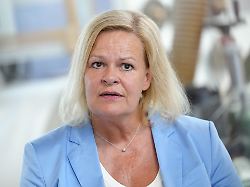Stricter security check
Faeser wants to better protect authorities from spies
8/12/2023 3:02 am
A few days ago, a suspected Russian spy in the Bundeswehr procurement office led to a cry for reforms, especially in security issues. They should come now. The Federal Minister of the Interior announces comprehensive measures.
After the arrest of a suspected Russian spy in the Bundeswehr Procurement Office in Koblenz, Federal Interior Minister Nancy Faeser announced an amendment to security checks in public authorities. “We will reform the law that regulates security checks,” Faeser told the Rheinische Post. “For example, it must be examined more closely how employees who work in security-critical areas deal with social media – also in order to identify enemies of the constitution at an early stage.”
There are already security checks that are more intensive, the more sensitive the area is. “Here, too, we are working on even stricter standards.” In addition, protection against acts of sabotage, for example on the IT systems, should be strengthened. It is also important to “create more awareness of the dangers,” warned the minister. “Suspicions must be recognized early and information passed on. There are often abnormalities,” said Faeser.
The threat of espionage is a pressing issue
Faeser had previously emphasized the aggravated security situation in Germany as a result of the war in Ukraine. “The threat of espionage, disinformation campaigns and cyber attacks has taken on a different dimension,” she told the newspapers of the Funke media group. The current case shows “that our security authorities are keeping an eye on Russian espionage in Germany and are taking consistent measures against it,” said Faeser.
On Wednesday, the Federal Public Prosecutor’s Office in Koblenz had an employee of the Bundeswehr Procurement Office arrested. The authority said he was accused of working for the Russian secret service.
He is said to have contacted the Russian embassy in Berlin and the consulate general in Bonn several times since May of his own accord and offered to work together. According to media reports, he is said to have worked in a department that deals with electronic warfare in the Bundeswehr and thus in a sensitive area.
